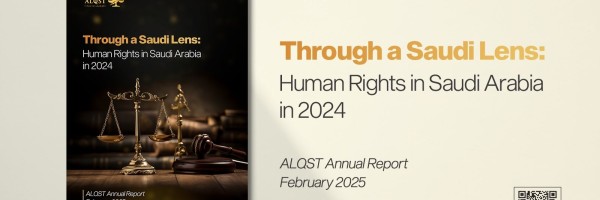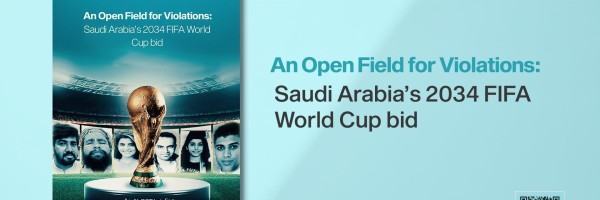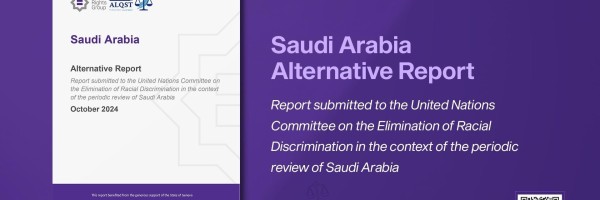Annual report issued by ALQST in the first quarter of each year, monitoring and documenting the main events of the previous year for the benefit of researchers, journalists, other organisations and anyone interested in reading a summary of the main human rights-related events occurring in Saudi Arabia.
The 55-page report documents the human rights situation in Saudi Arabia throughout 2019, showing the severity of the situation, and offers recommendations to the international community and the Saudi authorities, calling on the international community to intensify the pressure.
Executive summary
In response to the intensified crackdown on peaceful dissent, the gruesome murder of journalist Jamal Khashoggi and the brutal torture of women human rights defenders in 2018, ALQST started the year 2019 by launching its global #StandWithSaudiHeroes campaign, to advocate for and show solidarity with the Saudi women’s rights activists who campaigned heroically for reform but were subjected to torture and sexual harassment while in detention. During the year ALQST expanded the campaign, which is still ongoing into 2020, to include other prisoners of conscience.
The human rights situation in 2019 was still very much shaped by what had happened to Jamal Khashoggi inside the Saudi consulate in Istanbul on 2 October 2018, which arguably caused the Saudi authorities their biggest diplomatic crisis since the terrorist attacks of 9/11. In January the UN Special Rapporteur on extrajudicial, summary and arbitrary executions, Agnès Callamard, opened a special human rights investigation on her own initiative into Khashoggi’s killing. The report she presented to the UN Human Rights Council in June concluded that the murder of Khashoggi was “overseen, planned and endorsed by high-level state officials of Saudi Arabia”. She believed his killing constituted an international crime over which states should claim universal jurisdiction, and she called on the Human Rights Council, the Security Council or the UN Secretary-General to demand a follow-up criminal investigation.
The Saudi authorities, however – backed and emboldened by powerful international allies – continued on their course of cracking down on any and all critical voices, targeting journalists, activists and bloggers in fresh waves of arrests. They carried on trying prisoners of conscience, including Mohamed al-Otaibi, Essa al-Nukhaifi, leading women human rights defenders, and clerics like Salman al-Odah and Hassan Farhan al-Maliki, in judicial proceedings marred by violations of international fair trial guarantees. Moreover, in a sham trial five out of 11 individuals accused in the murder of Jamal Khashoggi were sentenced to death and three others to prison while Mohammed bin Salman and his adviser Saud al-Qahtani, as well as former deputy head of intelligence Ahmed al- Asiri, were exonerated of any involvement in the crime.
The Saudi authorities also continued to commit violations of international human rights and humanitarian law in Yemen that likely amount to crimes against humanity, in a war that has not only created the world’s largest humanitarian crisis but also caused more than 100,000 directly conflict-related fatalities.
The year 2019 also witnessed the largest number of executions in recent Saudi history. A total of 185 individuals were executed, including 37 in a mass execution on 23 April, most of them Shia men from the Eastern Province.
Meanwhile, to advance their economic Vision 2030, the Saudi authorities invested heavily in sport and entertainment and, in an attempt to whitewash the kingdom’s image and gloss over its appalling human rights record, rolled out a large-scale PR offensive seeking to attract major Western sports events to the kingdom and opened its doors to leisure tourism.
They also introduced a number of superficial reforms intended primarily to benefit women, allowing them to travel without a male guardian’s permission as well as granting them more control over family matters. This, however, came nowhere close to paving the way for gender equality in Saudi Arabia, as the male guardianship system continues to severely hamper women’s equal participation and decision-making in political, economic and social affairs.
The severity of the human rights situation, and the relentless efforts of international civil society and the Saudi diaspora, have however led to an unprecedented mobilisation of the global state community to publicly denounce human rights abuses committed by the Saudi government and demand accountability. The European Parliament passed a resolution in February strongly condemning the detention of leading women human rights activists, and of all human rights defenders, journalists, lawyers. The resolution called for an EU-wide ban on exports of surveillance systems to Saudi Arabia. In June, in the UK, the Court of Appeal ruled the UK government’s decision to continue licensing exports of military equipment to Saudi Arabia unlawful; and in July both chambers of the US Congress approved resolutions cutting off arms sales to the kingdom, though these were later vetoed by President Trump. Additionally, during the course of the year, and as a response to Khashoggi’s murder as well as the war in Yemen, several other governments suspended weapon sales to Saudi Arabia.
Meanwhile on 7 March 2019, in a landmark initiative at the United Nations, a group of 36 Member States led by Iceland delivered a joint statement during the 40th session of the Human Rights Council (HRC40) expressing serious concern over the human rights situation in Saudi Arabia, particularly freedom of expression, and condemning in the strongest possible terms the killing of Khashoggi. In a second joint statement in September, 25 UN Member States led by Australia raised concerns over the persecution and intimidation of activists, the practice of enforced disappearance and arbitrary detention, and reports of torture and unfair trials as well as extrajudicial executions. Furthermore, the statement called for an end to impunity over the murder of Khashoggi.
These recent initiatives of the international community to stand up against the commission of human rights violations by the Saudi authorities have inspired hope, and have also led to tangible concessions from the authorities, such as the temporary release of most of the detained women human rights defenders, who nevertheless continue to face trial, and the softening of some judicial decisions.
Since inaction, silence or complicity will only open the way to further abuses, ALQST calls on the international community to intensify the pressure on the Saudi government. The Saudi authorities should be urged to take a number of specific measures in order to improve the human rights situation in the country. The adoption of Saudi Arabia’s Universal Periodic Review (UPR) in March 2019, for example, lends itself as a tool with which to monitor the Saudi government’s compliance and assist it in improving its human rights record. At the time of the UPR’s adoption, the government pledged to ratify the two International Covenants on human rights; to guarantee women equality; to take precautionary measures and prevent indiscriminate use of force in the war in Yemen; to apply the death penalty for only the most serious crimes; and to revise provisions in the Counter-Terrorism Law allowing for incommunicado detention. The international community should now closely follow up on these human rights commitments to ensure their full implementation. Ultimately, it will be concrete measures such as these and their implementation that will determine whether the Saudi authorities are genuinely interested in reform or are determined to persist in disregarding the rights of citizens in Saudi Arabia and abroad.




